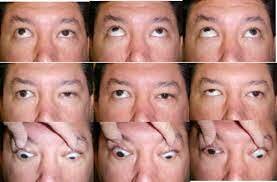Duane Retraction Syndrome (DRS) is a rare eye movement disorder that affects the muscles responsible for controlling eye movement. It is characterized by limitations in horizontal eye movement, particularly when attempting to move the eye inward towards the nose.
Duane Retraction Syndrome is a congenital condition, meaning it is present from birth. It occurs due to an abnormal development of the cranial nerves that control eye movement, specifically the sixth cranial nerve (abducens nerve) and the third cranial nerve (oculomotor nerve). These nerves are responsible for coordinating the movement of the eye muscles. In individuals with DRS, there is a miswiring or absence of these nerves, leading to limited eye movement and associated features.
The exact cause of Duane Retraction Syndrome is not fully understood, although it is believed to result from a combination of genetic and environmental factors. Some cases of DRS have been linked to specific genetic mutations.
Duane Retraction Syndrome is classified into three main types:
- Type 1: Also known as Duane Syndrome Type 1, this is the most common form of DRS. It is characterized by limited eye movement inward (toward the nose) and may be accompanied by a retraction of the eye and narrowing of the eyelid opening.
- Type 2: Duane Syndrome Type 2 presents with limited eye movement outward (toward the ear). In some cases, there may be some degree of retraction of the eye.
- Type 3: Duane Syndrome Type 3 is the least common form of DRS. It involves limited eye movement both inward and outward, resulting in a fixed position of the affected eye.
The primary symptom of Duane Retraction Syndrome is the limitation of horizontal eye movement. When attempting to move the affected eye inward, the eye may retract or “pull back” into the socket, accompanied by narrowing of the eyelid opening. This gives rise to a characteristic “retraction” of the eye. Depending on the type of DRS, the limitation may also affect outward eye movement.
The condition can have a significant impact on visual function and binocular vision, which is the ability of the eyes to work together to create a single, fused image. Individuals with DRS may experience:
- Amblyopia (lazy eye): The limited eye movement can lead to reduced visual acuity in the affected eye, causing one eye to become “lazy” or weaker in vision compared to the other eye.
- Head turn or tilt: To compensate for the limited eye movement, individuals with DRS may adopt a head turn or tilt to achieve better alignment of their eyes.
- Strabismus: Misalignment of the eyes, known as strabismus, can occur in DRS. This may manifest as an inward or outward deviation of the affected eye.
While there is no cure for Duane Retraction Syndrome, treatment aims to manage symptoms and improve visual function. The approach may vary depending on the severity of the condition and the specific symptoms experienced by the individual.
Treatment options for Duane Retraction Syndrome include:
- Vision correction: Glasses or contact lenses may be prescribed to correct any refractive errors and optimize visual acuity.
- Vision therapy: Specialized exercises and techniques may be recommended to improve eye coordination and strengthen the affected eye muscles.
- Surgical intervention: In some cases, surgery may be considered to alleviate strabismus, improve eye alignment
At The Eye Center- Dr. Mahnaz Naveed Shah & Associates our team of eight ophthalmology subspecialists/ eye specialists, eye surgeons who are considered amongst the very best eye specialists in Karachi and in Pakistan, have the diagnostic and treatment capabilities to treat from the simplest to the most complex patients. We work hard to provide our patients with the best possible medical and surgical eye care, in a state of the art purpose built eye care facility. We offer the entire array of medical, laser and surgical treatments to help provide patients the best possible care in the most efficient, safe and ethical manner.
If you need an appointment, please contact us at 03041119544 during our working hours or leave us a WhatsApp message at +923028291799 and someone will connect with you. Walk-in appointments are also available for emergencies. We can also be reached through our web portal on www.surgicaleyecenter.org


